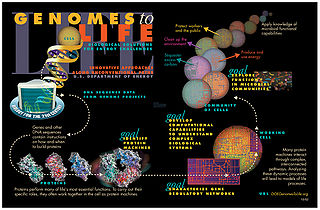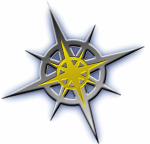
Bioinformatics is an interdisciplinary field of science that develops methods and software tools for understanding biological data, especially when the data sets are large and complex. Bioinformatics uses biology, chemistry, physics, computer science, data science, computer programming, information engineering, mathematics and statistics to analyze and interpret biological data. The process of analyzing and interpreting data can sometimes be referred to as computational biology, however this distinction between the two terms is often disputed. To some, the term computational biology refers to building and using models of biological systems.

Computational biology refers to the use of techniques in computer science, data analysis, mathematical modeling and computational simulations to understand biological systems and relationships. An intersection of computer science, biology, and data science, the field also has foundations in applied mathematics, molecular biology, cell biology, chemistry, and genetics.

Systems biology is the computational and mathematical analysis and modeling of complex biological systems. It is a biology-based interdisciplinary field of study that focuses on complex interactions within biological systems, using a holistic approach to biological research.

In biology and other experimental sciences, an in silico experiment is one performed on a computer or via computer simulation software. The phrase is pseudo-Latin for 'in silicon', referring to silicon in computer chips. It was coined in 1987 as an allusion to the Latin phrases in vivo, in vitro, and in situ, which are commonly used in biology. The latter phrases refer, respectively, to experiments done in living organisms, outside living organisms, and where they are found in nature.

The Biocomplexity Institute of Virginia Tech was a research institute specializing in bioinformatics, computational biology, and systems biology. The institute had more than 250 personnel, including over 50 tenured and research faculty. Research at the institute involved collaboration in diverse disciplines such as mathematics, computer science, biology, plant pathology, biochemistry, systems biology, statistics, economics, synthetic biology and medicine. The institute developed -omic and bioinformatic tools and databases that can be applied to the study of human, animal and plant diseases as well as the discovery of new vaccine, drug and diagnostic targets.
Bioconductor is a free, open source and open development software project for the analysis and comprehension of genomic data generated by wet lab experiments in molecular biology.
Computational genomics refers to the use of computational and statistical analysis to decipher biology from genome sequences and related data, including both DNA and RNA sequence as well as other "post-genomic" data. These, in combination with computational and statistical approaches to understanding the function of the genes and statistical association analysis, this field is also often referred to as Computational and Statistical Genetics/genomics. As such, computational genomics may be regarded as a subset of bioinformatics and computational biology, but with a focus on using whole genomes to understand the principles of how the DNA of a species controls its biology at the molecular level and beyond. With the current abundance of massive biological datasets, computational studies have become one of the most important means to biological discovery.

QIAGEN N.V. is a German-founded multinational provider of sample and assay technologies for molecular diagnostics, applied testing, academic research, and pharmaceutical research. The company operates in more than 35 offices in over 25 countries. QIAGEN N.V., the global corporate headquarter of the QIAGEN group, is located in Venlo, The Netherlands. The main operative headquarters are located in Hilden, Germany. European, American, Chinese, and Asian-Pacific regional headquarters are located respectively in respectively Hilden, Germany; Germantown, Maryland, United States; Shanghai, China; and Singapore. QIAGEN's shares are listed at the NYSE and at the Frankfurt Stock Exchange in the Prime Standard. Thierry Bernard is the company's Chief Executive Officer (CEO).

Microarray analysis techniques are used in interpreting the data generated from experiments on DNA, RNA, and protein microarrays, which allow researchers to investigate the expression state of a large number of genes – in many cases, an organism's entire genome – in a single experiment. Such experiments can generate very large amounts of data, allowing researchers to assess the overall state of a cell or organism. Data in such large quantities is difficult – if not impossible – to analyze without the help of computer programs.

GenMAPP is a free, open-source bioinformatics software tool designed to visualize and analyze genomic data in the context of pathways, connecting gene-level datasets to biological processes and disease. First created in 2000, GenMAPP is developed by an open-source team based in an academic research laboratory. GenMAPP maintains databases of gene identifiers and collections of pathway maps in addition to visualization and analysis tools. Together with other public resources, GenMAPP aims to provide the research community with tools to gain insight into biology through the integration of data types ranging from genes to proteins to pathways to disease.

CLC bio was a bioinformatics software company that developed a software suite subsequently purchased by QIAGEN.
LabKey Server is a software suite available for scientists to integrate, analyze, and share biomedical research data. The platform provides a secure data repository that allows web-based querying, reporting, and collaborating across a range of data sources. Specific scientific applications and workflows can be added on top of the basic platform and leverage a data processing pipeline.
John Quackenbush is an American computational biologist and genome scientist. He is a professor of biostatistics and computational biology and a professor of cancer biology at the Dana–Farber Cancer Institute (DFCI), as well as the director of its Center for Cancer Computational Biology (CCCB). Quackenbush also holds an appointment as a professor of computational biology and bioinformatics in the Department of Biostatistics at the Harvard School of Public Health.
Integromics was a global bioinformatics company headquartered in Granada, Spain and Madrid. The company had subsidiaries in the United States and United Kingdom, and distributors in 10 countries. Integromics specialised in bioinformatics software for data management and data analysis in genomics and proteomics. The company provided a line of products that serve gene expression, sequencing, and proteomics markets. Customers included genomic research centers, pharmaceutical companies, academic institutions, clinical research organizations, and biotechnology companies.
A bioinformatics workflow management system is a specialized form of workflow management system designed specifically to compose and execute a series of computational or data manipulation steps, or a workflow, that relate to bioinformatics.

Pathway is the term from molecular biology for a curated schematic representation of a well characterized segment of the molecular physiological machinery, such as a metabolic pathway describing an enzymatic process within a cell or tissue or a signaling pathway model representing a regulatory process that might, in its turn, enable a metabolic or another regulatory process downstream. A typical pathway model starts with an extracellular signaling molecule that activates a specific receptor, thus triggering a chain of molecular interactions. A pathway is most often represented as a relatively small graph with gene, protein, and/or small molecule nodes connected by edges of known functional relations. While a simpler pathway might appear as a chain, complex pathway topologies with loops and alternative routes are much more common. Computational analyses employ special formats of pathway representation. In the simplest form, however, a pathway might be represented as a list of member molecules with order and relations unspecified. Such a representation, generally called Functional Gene Set (FGS), can also refer to other functionally characterised groups such as protein families, Gene Ontology (GO) and Disease Ontology (DO) terms etc. In bioinformatics, methods of pathway analysis might be used to identify key genes/ proteins within a previously known pathway in relation to a particular experiment / pathological condition or building a pathway de novo from proteins that have been identified as key affected elements. By examining changes in e.g. gene expression in a pathway, its biological activity can be explored. However most frequently, pathway analysis refers to a method of initial characterization and interpretation of an experimental condition that was studied with omics tools or genome-wide association study. Such studies might identify long lists of altered genes. A visual inspection is then challenging and the information is hard to summarize, since the altered genes map to a broad range of pathways, processes, and molecular functions. In such situations, the most productive way of exploring the list is to identify enrichment of specific FGSs in it. The general approach of enrichment analyses is to identify FGSs, members of which were most frequently or most strongly altered in the given condition, in comparison to a gene set sampled by chance. In other words, enrichment can map canonical prior knowledge structured in the form of FGSs to the condition represented by altered genes.
The Flatiron Institute is an American internal research division of the Simons Foundation, launched in 2016. The mission of the Flatiron Institute is to advance scientific research through computational methods, including data analysis, theory, modeling, and simulation. The Flatiron Institute was dedicated with a ceremony on September 6, 2017. and takes its name from the Flatiron District in New York City where it is based.
Jean Yee Hwa Yang is an Australian statistician known for her work on variance reduction for microarrays, and for inferring proteins from mass spectrometry data. Yang is a Professor in the School of Mathematics and Statistics at the University of Sydney.









